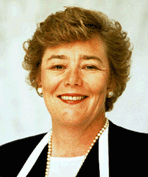
Rep. Bob
Goodlatte
House Judiciary Committee Approves Y2K Litigation Reform Bill
(May 4, 1999) The House Judiciary Committee approved HR 775, the Y2K Readiness and Responsibility Act, by a vote of 15 to 14 on Tuesday afternoon, May 4. Except for Rep. Lindsey Graham (R-SC), the vote followed party lines. The Committee also rejected a weaker version of the bill offered by Rep. Zoe Lofgren (D-CA).
| See, Summary of Y2K Litigation Bills in the 106th Congress. |
The House Judiciary Committee adopted an amendment in the nature of a substitute to the Y2K Readiness and Responsibility Act. The original version of the bill, HR 775 IH, is sponsored by Rep. Tom Davis (R-VA). The amendment adopted by the committee was offered by Rep. Bob Goodlatte (R-VA) (web site | bio).
 |
|
Rep. Bob |
The bill as adopted retains a wider range of provisions than the bill currently being considered in the Senate, which has been revised several times to build bipartisan support. The Goodlatte version of the bill would replace joint and several liability with proportionate liability in Y2K actions. It would create a 90 "cooling off period" before a Y2K suit could be filed. It would also limit punitive damage awards, limit attorneys fees to $1,000 per hour, and limit the personal liability of corporate officers and directors.
Democrats and the Clinton administration opposed the bill. With the exception of Rep. Lindsay Graham (R-SC), all of the Republican members of the Judiciary Committee who voted on Tuesday supported the Goodlatte amendment, and the bill. Rep. Graham was present for much of the lengthy markup session, but made no statement. During the final round of voting Rep. Graham sat in the audience section of the hearing room.
 |
|
Rep. Lofgren |
Rep. Zoe Lofgren (D-CA) (web site | bio) offered an amendment that would have retained the 90 day "cooling off period" and modified joint and several liability so that defendants who are only minimally responsible for Y2K problems are only proportionally liable. Rep. Lofgren described her version of the bill as "an effort to find common ground." However, she did not pick up Republican support, and some Democrats remained opposed to any bill. The roll call vote on her amendment failed by 9 to 15.
The die hard opponents of any Y2K litigation reform who actively participated in the debate on Tuesday included Rep. William Delahunt (D-MA), Rep. Jerrold Nadler (D-NY), and Rep. Barney Frank (D-MA).
On the other hand, several Democrats sought to amend the Goodlatte version. These included Rep. Robert Scott (D-VA) and Rep. Melvin Watt (D-NC). Rep. Goodlatte, who managed the bill on behalf of the Republicans, accepted several technical amendments offered by Rep. Scott, but opposed several substantive amendments that would have weakened the bill. These were then rejected by the Committee in a series of voice and roll call votes.
Rep. Nadler offered an amendment that would have removed a provision from the Goodlatte version that provides that Y2K class action suits which are multi-state in nature must be brought in federal court. Rep. Goodlatte stated that "our intention is not to impair the right to bring class actions," but rather to shift multi-state class actions into federal court. Rep. Goodlatte further asserted that some state court judges have abused the class action certification process. Several Democrats asserted that the provision was anti states' rights. Rep. Maxine Waters called it "anti-consumer." The amendment failed.
Rep. Nadler also offered an amendment to remove the requirement in the Goodlatte version that in Y2K class action suits class members be given actual notice by certified mail with return receipt requested. He argued that this was financially burdensome. Rep. Goodlatte responded that "we want the members of the class to be notified of the action." The amendment failed 4 to 13.
Rep. Scott offered a series of amendments. Rep. Goodlatte accepted several technical
and clarifying changes. These were then promptly adopted by unanimous consent. However,
several were opposed, and failed in voice or roll call votes. One would have altered the
provision limiting liability of officers and directors. Another would have shifted the
burden of proof of proportionate liability from the plaintiffs to the defendants. Another
would have changed the language regarding "material defect". Finally, Rep. Scott
sought unsuccessfully to have the requirement of certified mail notice to class members be
made discretional on the part of the trial court judge.
Related Stories |
| Senators Back Y2K Litigation Reform, 1/16/99. McCain Y2K Litigation Bill is a Work in Progress, 2/15/99. Hollings Opposes Y2K Litigation Reform Bill, 2/15/99. Senate Committee Passes Y2K Act, 3/4/99. McCain and Wyden Offer Amended Version of S 96, 4/26/99. Clinton Administration Opposes Y2K Litigation Bill, 4/29/99. Senate Y2K Act Delayed by Democrats, 4/30/99. Senate Y2K Act Not Dead Yet, 5/2/99. |